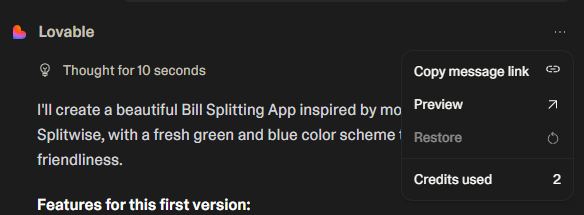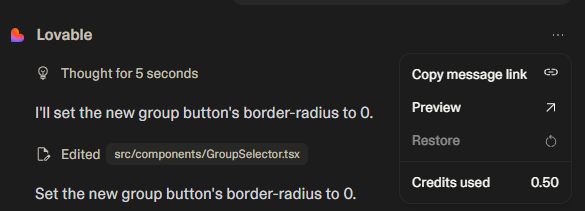


Figuring out Lovable.dev pricing isn’t as straightforward as looking at the numbers on the pricing page. The platform uses a credit-based system, and every AI action consumes credits at a different rate depending on complexity.
On paper, the plans start at $25 for 100 credits, but in practice, you may spend more as your app takes shape.
To see how far those credits go, I built a small app and tracked the credits for each build step and tweak used. The result is a clearer picture of how much value you can expect from Lovable’s free and paid plans.
In this article, we’ll cover:
- Each of Lovable’s pricing plans and what it offers
- Honest recommendations about which plan fits your needs
- How Superblocks, Cursor, and Bolt compare to Lovable
Lovable.dev pricing plans: TL;DR
If you just want the quick breakdown, here’s an overview of Lovable.dev’s pricing plans:
Lovable.dev pricing plans breakdown
Lovable offers four pricing plans:
- The free tier is enough for testing out the platform. With 5 daily credits, you can create an app skeleton and make one or two tweaks before hitting the daily cap.
- The Pro plan is the first tier that supports real building. It's 100 monthly credits plus private projects, code editing, and custom domains make it the best choice for solo developers.
- The Business plan doubles the cost of Pro but mainly adds SSO and data privacy controls. It’s only worth it if your team requires those compliance features.
- The Enterprise plan is for large organizations with strict security or integration requirements.
Here’s what’s included in each plan:
- Free tier
What you get:
- 5 credits daily (30 max per month, no rollover).
- Public projects hosted on Lovable's domain.
- Workspace collaboration with unlimited team members.
Best for: Testing Lovable's capabilities and building simple proof-of-concepts.
Pros:
- Access to the visual editor.
- GitHub version control integration for version history and local code editing.
Cons:
- Frequent credit limits interrupt workflow.
- It only allows public projects.
- Read-only code access makes debugging harder.
- Pro plan: $25/month
What you get:
- 100 monthly credits + 5 daily credits (up to 150 total per month).
- Private project hosting.
- Custom domain support.
- User roles and permissions.
- Option to remove Lovable branding.
Best for: Individual developers needing more credits than what the free plan offers.
Pros:
- Edit the underlying code directly in Lovable.
- Host apps on your own domain.
- Credits roll over month to month.
- Keep your projects private.
Cons:
- Rolled-over credits cap at your monthly or annual limit.
- Business plan: $50/month
What you get:
- All Pro plan features.
- 100 monthly credits + 5 daily credits.
- Single Sign-On (SSO) integration.
- Data training opt-out.
- Reusable design templates.
Best for: Teams requiring enterprise security features and data privacy controls.
Pros:
- Enhanced security with SSO.
- Data privacy protection.
- Design system templates.
Cons:
- The value proposition is unclear unless you need specific security features.
- Enterprise plan: Custom pricing
What you get:
- Dedicated customer support.
- Professional onboarding services.
- Custom API connections.
- Group-based access controls.
- Custom design systems.
Best for: Large organizations needing hands-on support and custom integrations.
Pros:
- White-glove onboarding.
- Custom integrations and connections.
- Group access management.
Cons:
- It likely has a significant cost increase.
Students can claim up to 50% off Lovable plans by signing up with their university email address.
How Lovable's credit system works
Lovable uses a credit-based pricing model and consumes credits differently based on the mode.
In the default (build) mode, Lovable deducts credits based on the complexity of the code changes you request. In chat mode (no code edits), Lovable deducts 1 credit for each message.
To test how many credits different tasks consumed, I used Lovable on the free plan to build a simple bill-splitting app. I could see the cost of each message in the message history by hovering over the three dots of a message. The 5 daily credits on the free plan disappear quickly. Expect to hit the limit after 3 meaningful interactions.
For example, when I asked Lovable to create the initial app structure, it consumed 2 credits.

When I requested a change to a button’s border radius, it used 0.5 credits.

Which Lovable.dev plan should you choose?
Not sure which plan fits your needs? Here’s a quick guide to help you decide:
- Choose the free plan if you’re evaluating AI app builders and testing Lovable against competitors.
- Choose Pro if you are constantly asking for code changes and need the option to buy add-on credits, or want code-level editing capabilities inside Lovable.
- Choose Business if your team requires SSO authentication and wants to opt out of models using your data for training.
- Choose Enterprise if you’re a large organization and need group-based access controls to manage users or custom integrations.
Is Lovable.dev worth the cost?
Lovable is worth the cost if you’re testing product ideas or iterating with stakeholders by building React-based prototypes. However, you’ll need to know how to prompt properly to get your money’s worth.
Skip Lovable.dev if you need to build production-grade apps or mobile apps.
Lovable.dev alternatives and pricing comparison
If Lovable’s development approach doesn’t address your needs, there are several alternatives to choose from. They include Superblocks, Cursor, and Bolt.
Superblocks is an AI-native app builder for internal tools, and Cursor is an AI code editor that assists you as you write code. Bolt is the most similar to Lovable, but it supports both web and mobile apps.
Before we discuss which one you should choose, here’s how they compare:
Superblocks vs Lovable.dev: Which should you choose?
Superblocks is better for building production-grade internal tools. Like Lovable, it supports AI app generation. However, Superblocks produces more secure and standardized apps. The AI agent is fully aware of your security policies, coding best practices, and design standards.
Lovable.dev is better for validating ideas and iterating with stakeholders before committing to a more resilient stack.
Use both platforms if you need internal tooling capabilities from Superblocks and customer-facing prototype development from Lovable.
My bottom line on Lovable.dev pricing
Lovable works best for users who can write clear, detailed prompts. If your prompts are vague, you’ll burn through credits with extra iterations. It also helps to plan your project architecture upfront so you’re not stuck in endless back-and-forth with the AI.
When you hit persistent errors or the AI just isn’t doing what you expect, it’s usually a good time to switch over to a cheaper IDE-based assistant like Claude Code ($17/month) or Gemini CLI (free 60 model requests/minute and 1,000 requests/day). It’ll save you both the frustration and credits. If you don’t want to code, Lovable recommends creating a new copy.
Use Superblocks to build secure, governed internal tools
Superblocks is the best option for businesses that want vibe coding speed but within their organizational standards for code quality, design, and security. It pairs AI-driven app generation with centralized governance features like SSO, RBAC, audit logs, and more, so every app meets security requirements by default.
The platform’s extensive features support this balance:
- Flexible development modalities: Teams can use Clark to generate apps from prompts, the WYSIWYG drag-and-drop editor, or code. Superblocks syncs the changes you make in code and the visual editor.
- AI guardrails: Every app built with Clark abides by organizational standards for data security, permissions, and compliance. This addresses the major LLM risks of ungoverned shadow AI app generation.
- Centrally managed governance layer: It supports granular access controls with RBAC, SSO, and audit logs, all centrally governed from a single pane of glass across all users. It also integrates with secret managers for safe credentials management.
- Keep data on prem: It has an on-prem agent you can deploy within your VPC to keep sensitive data in-network.
- Extensive integrations: It can integrate with any API or databases. These integrations include your SDLC processes, like Git workflows and CI/CD pipelines.
Ready for fast, secure internal tool generation? Book a demo with one of our product experts.
Frequently asked questions
How much does Lovable.dev cost?
Lovable.dev costs $25/month for 100 credits, and $50/month if you want security features like SSO and a data opt-out option. The free plan gives you 5 daily credits that max out at 30 per month.
Does Lovable.dev have a free tier?
Yes, Lovable.dev offers a free tier with 5 daily credits (30 per month maximum). You can build public projects and collaborate with unlimited team members.
What are Lovable’s pricing credits?
Lovable.dev pricing credits are the internal currency you use when sending messages in Lovable. Chat mode uses 1 credit per message; default mode consumes different amounts based on task complexity.
Is Lovable.dev free forever?
Yes, Lovable.dev's free tier is free forever for 5 daily credits and public projects only. You'll need to upgrade to paid plans for private projects and higher credit limits.
Which Lovable.dev plan is best for teams?
The Business plan at $50/month is best for teams because it includes SSO authentication, data training opt-out, and design templates.
Are there free alternatives to Lovable.dev?
Yes, there are free alternatives to Lovable, including Bolt.diy, Firebase Studio, and manually coding within your code editor.
Stay tuned for updates
Get the latest Superblocks news and internal tooling market insights.
Request early access
Step 1 of 2
Request early access
Step 2 of 2
You’ve been added to the waitlist!
Book a demo to skip the waitlist
Thank you for your interest!
A member of our team will be in touch soon to schedule a demo.
Table of Contents



.png)
.png)
%20(1).png)